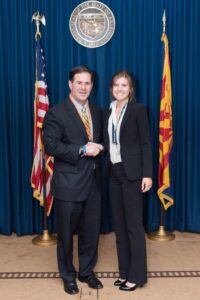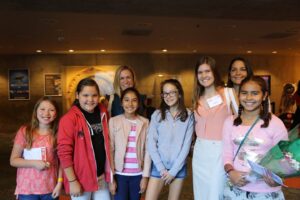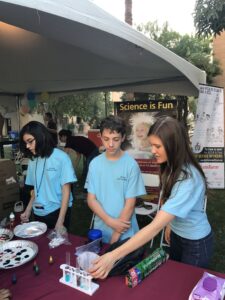Chief Science Officer Dana is a senior at Sandra Day O’Connor High School.
 What is your favorite class in school?
What is your favorite class in school?
I feel I enjoyed my Honors Chemistry class the most. I had only touched on basic chemistry in middle school, but being able to dive into the subject more deeply and with greater rigor was especially rewarding for me. We didn’t have to memorize the periodic table; the class was about understanding the concepts and utilizing the resources we had to come to solutions. The connection with my teacher also played an important role in my enjoyment; he was always supportive of my scientific endeavors outside of the classroom, giving me more confidence in my abilities!
Any idea of what you want to be when you’re an adult? The path you’ll take to get there?
I plan to study neuroscience, sustainability, and entrepreneurship at a college or university to learn how I can create ethically-based companies that develop solutions which support human and environmental health. The journey continues every day as I strive to take steps to further my education and empower others around me to follow their passions. Everyone should make the effort to be a lifelong learner, even beyond the formal education system.
Chief Science Officers bridge the gap between the student voice and administration in regards to education. It’s both an honor and a responsibility. As an advocate for quality STEM education and a voice for thousands of fellow students, we must remember to act in a professional manner and spread our enthusiasm about science to anyone and everyone! What I’ve found to be most rewarding as a CSO are the personal development and problem-solving skills we learn at our institutes, cabinet meetings, and mentors throughout the school year. When people first hear of the CSO program, their initial thoughts of what we learn are very “STEM-y” skills like building robots or coding. Although we do receive fun training in these areas, networking, communication, public speaking, problem-solving and organizational skills are the focus, all applicable to any area of life. I’ve noticed massive increases in these skills in a single year of becoming a CSO and I see it in others too!
Is there anything unexpected about being a CSO?
Before becoming a CSO, you don’t realize the influence your voice holds or the willingness of business professionals and government officials to listen to it! Nor, do you realize the number of amazing opportunities out there for those (like Chief Science Officers) who are willing to go after them. Even the amount of confidence you gain through the communication and networking skills taught by CSO mentors was a (welcomed) surprise to me.
Do you have a favorite teacher or a role model?
My 7th grade math teacher, Mr. Ferguson, encouraged my curiosity and learning beyond the classroom material. In turn, I cultivated the skills and found the freedom to learn subjects on my own. My role model now is Susan Farretta, the Educational Initiatives Director for the AZ Technology Council, my supervisor, my mentor, and my friend. Her ability to lead by example, empower others, and encourage others to be confident and stand up for what they believe is a skill I strive to cultivate more in my professional and personal life. Her glowing enthusiasm is more contagious than the flu! She is always a joy to be around.
 Dana has some words of advice to students for following their passions: “Three words: own your weirdness.” When you learn to follow your heart and define your goals in life, finding ways of getting there becomes a game of creativity, planning and perseverance. If you have a goal, find a way to get there and don’t stop until you do! Anything can be accomplished with the right attitude, right resources, and right people working together.
Dana has some words of advice to students for following their passions: “Three words: own your weirdness.” When you learn to follow your heart and define your goals in life, finding ways of getting there becomes a game of creativity, planning and perseverance. If you have a goal, find a way to get there and don’t stop until you do! Anything can be accomplished with the right attitude, right resources, and right people working together.
Learn more about the Chief Science Officers Program here.

